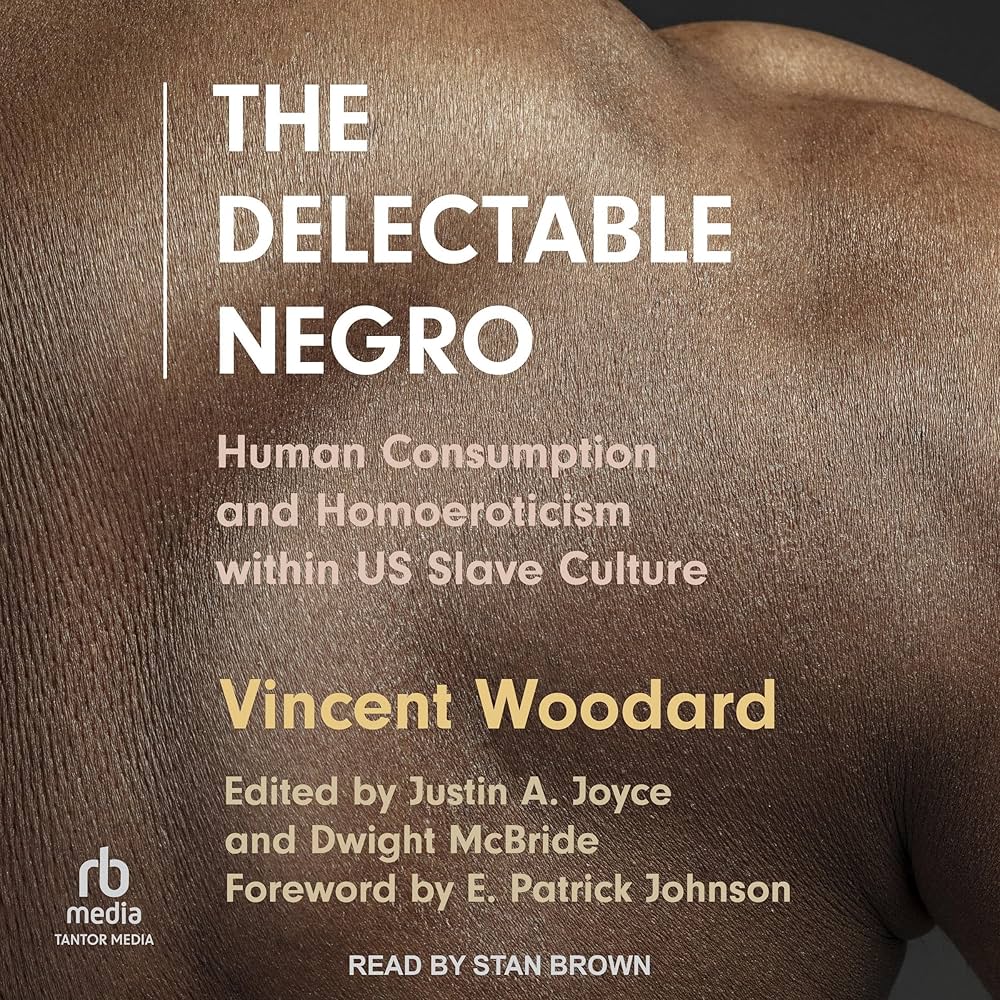
Book review by Anang Tawiah: The Delectable Negro: Human Consumption and Homoeroticism within US Slave Culture by Vincent Woodard
The Delectable Negro: Human Consumption and Homoeroticism within US Slave Culture by Vincent Woodard
Highlights:
Three-Part Review Overview, strengths and limitations, legacy
Chapter Breakdown Thematic chapters with key analytical insights
Article Bundle Four SEO-ready article outlines with keywords and structure
The Delectable Negro: Human Consumption and Homoeroticism within US Slave Culture by Vincent Woodard, structured in three parts, followed by a chapter-by-chapter breakdown with key highlights and examples, and wrapped up with an SEO-ready article bundle.
Part 1 – Three-Part Book Review Format
1. Overview and Significance
The Delectable Negro (published posthumously in 2014; Vincent Woodard, edited by Justin A. Joyce and Dwight A. McBride; foreword by E. Patrick Johnson) probes the deeply disturbing and rarely discussed intersections of cannibalism, homoeroticism, and consumption in U.S. slave culture. It takes seriously Black accounts of literal and figurative human consumption—ranging from documented starvation and rituals to literary metaphors and sexualized violence. Woodard draws on a wide array of sources—including WPA interviews, slave narratives, runaway ads, and the writings of Harriet Jacobs and Frederick Douglass—to uncover how the enslaved body became an object of desire, horror, and power dynamics.(Wikipedia, NYU Press, 52walker.com)
2. Strengths and Limitations
Strengths:
-
Woodard breaks new ground by treating Black narratives of cannibalism as valid historical claims rather than dismissed superstition. He unearths a complex cultural framework in which consumption functioned both literally and symbolically.(Wikipedia, 52walker.com)
-
His interdisciplinary method—blending critical theory, literary analysis, and historical documentation—makes the work a powerful intervention in both Black studies and discussions of slavery, sexuality, and violence.(NYU Press, Wikipedia)
Limitations:
-
Since Woodard passed away before the book’s publication, he is unable to respond to critiques or expand on interpretive ambiguities, and the format reflects this distance.(Wikipedia, NYU Press)
-
Some readers may find the book’s metaphoric use of cannibalism challenging, and distinguishing literal from figurative accounts may require careful engagement.
3. Legacy and Contribution
The book won the Lambda Literary Award for LGBT Studies in 2015. Critics have called it a daring, brilliant interrogation of the enslaved body as consumable—both erotically and institutionally. Its groundbreaking perspective forces readers to reconsider narratives of slavery as fundamentally parasitic and erotically charged, disrupting approaches that separate hunger, violence, and desire.(Wikipedia, Oxford Academic, NYU Press)
Part 2 – Chapter-by-Chapter Breakdown with Highlights and Examples
Drawing from the table of contents (as available via JSTOR), here is a thematic breakdown of the book’s structure:
-
Introduction: “Master ... eated me when I was meat”
-
Sets the stage by inverting metaphors of hunger—envisioning the slaveholder as someone consuming the enslaved body and identity.(JSTOR)
-
-
Cannibalism in Transatlantic Context
-
Sex, Honor, and Human Consumption
-
Emphasizes how consumption was intertwined with preservation of white honor and sexual control over Black bodies.(JSTOR)
-
-
A Tale of Hunger Retold: Ravishment and Hunger in Frederick Douglass’s Life and Writing
-
Domestic Rituals of Consumption
-
Explores household rituals that normalized consumption—such as seasoning tropes and oral culture in slavery.(JSTOR)
-
-
Eating Nat Turner
-
The Hungry N-Word
-
Examines the racial politics of labeling Black men as insatiable, reading hunger and desire through the lens of racial slurs and stereotypes.(JSTOR)
-
Part 3 – SEO-Optimized Article Bundle
Below is a curated bundle of blog-style articles designed to maximize search visibility and engagement:
| Article Title | Target Keywords | Outline |
|---|---|---|
| 1. Exposing Desire and Violence: A Review of The Delectable Negro | The Delectable Negro book review, Vincent Woodard slavery homoeroticism | • Introduction to Woodard's intervention • Overview of core concepts (cannibalism, homoeroticism) • Why the book matters now |
| 2. 5 Disturbing Realities Unearthed in The Delectable Negro | slavery cannibalism historical metaphor, homoerotic consumption slave culture | • Slave narratives of cannibalism • Douglass’s metaphors of hunger • Nat Turner rumors • Seasoning and oral consumption rituals • Hunger as erotic objectification |
| 3. Food, Flesh, and Power: How The Delectable Negro Reshapes Our Understanding of Slavery | power consumption slavery studies, Black male body critique, Vincent Woodard legacy | • Slavery as parasitism • Erotic consumption of Black bodies • Reframing Black male interiority • Impact on literary and cultural criticism |
| 4. Teaching Difficult Histories: Using The Delectable Negro in Curriculum | teaching slavery with difficult topics, curriculum on slavery eroticism, pedagogy Black studies | • Lesson ideas per chapter/theme • Discussion prompts (e.g., “What does consumption reveal about power?”) • Suggested companion readings and context |

